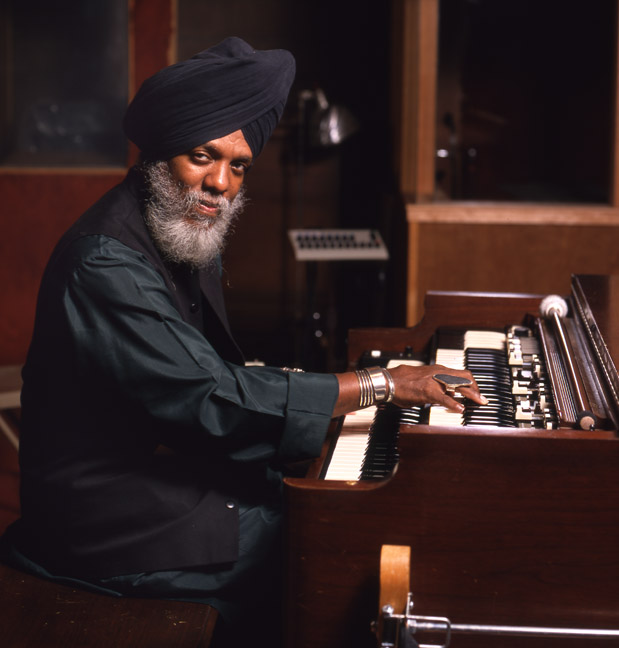
At age 74, Hammond organist Dr. Lonnie Smith still looks like a kid in the candy store every time he gets behind his keyboard.
On Saturday, the kid from Lackawanna, N.Y., fed off of the energy of a sold-out crowd at the Arts Garage in Delray Beach. Those attending included some old friends from the 1990s, when the turban-topped keyboardist was part of the house band at O’Hara’s in Fort Lauderdale.
Of course, some patrons were undoubtedly also there because of Smith’s 50-year recording career — which started simultaneously in the mid-1960s bands of guitarist George Benson, saxophonist Lou Donaldson, and as a solo artist on Blue Note Records.
Smith returned to Blue Note 45 years after his previous recording for the label to release his latest, Evolution, a 2016 CD featuring guitarist Jonathan Kreisberg and drummer Joe Dyson, the musicians who completed the bandleader’s personnel at the Arts Garage.
The trio opened with Smith’s composition “Backtrack,” the loping leadoff track to his outstanding 2012 live CD The Healer, released on his own Pilgrimage label. It proved a whisper-to-scream exercise in dynamics. Smith sang the melody a foot away from his vocal microphone as he simultaneously played it; Kreisberg went from sparse accompaniment to a soaring solo, and Dyson from quiet rim shots to full-on assault midway.
Tadd Dameron’s ballad “On a Misty Night” downshifted the performance via Smith’s blues and gospel nuances, Kreisberg’s volume swells, and Dyson’s use of brushes before switching to drum sticks. But both opening selections would prove to be appetizers toward the remaining main course.
Paul Simon’s “50 Ways To Leave Your Lover” became a rave-up through the creativity of Smith and Kreisberg. The guitarist quoted Simon’s familiar vocal melody before an effects-laden break that proved top-shelf even among his several standout solos. Then it was Smith’s turn, and the keyboardist delivered, complete with sing-along accompaniment and comic book faces as he eyed and fed off of the crowd.
“That was ‘Fiddy Ways To Leave Your Lover,’” Smith said amid the resulting roar. “Not fifty, but fiddy.”
Trumpeter Dave Hubbard’s funky, swinging “Devika” proved a great changeup, with a Brazilian undercurrent that clearly suited Kreisberg, who delivered another banner solo. The trio even achieved a high degree-of-difficulty controlled fadeout on the piece, which requires each musician to listen intently and be accordingly dynamic.
Then it was time for a shocker. Smith’s as-yet unrecorded ballad “The Days of Old” featured a pensive intro by Kreisberg; Dyson playing with a brush in his left hand and shaken percussive beads in his right, and the keyboardist coaxing eerie, low-register, tuba-like tones from a synthesizer resting at the top of the Hammond organ.
The shocking part, though, was his vocal. Like many keyboardists, Smith often sings a solo as he plays it. But also like many keyboardists, he sings flat compared to his instrumental notes, something that becomes noticeable when he gets too close to the microphone. Yet on “The Days of Old,” a wistful remembrance of a long life mostly lived through the pre-Internet era, his voice soared as he sang directly into the mic to deliver lines like, “Remember when we walked and talked in the park … of the love we knew?”
It was akin to film noir music, or the soundtrack to a lost Twin Peaks episode.
The keyboardist’s gospel intro, and Kreisberg’s bluesy solo, highlighted “Pilgrimage,” the slow strut featured on The Healer. The Smith-penned piece was sandwiched by two jazz standards featured on Evolution. The first was Thelonious Monk’s “Straight No Chaser,” which roared via Smith and Kreisberg solos as Dyson percolated underneath — all before the guitarist used a wah-wah pedal to punctuate its acidic finale.
On Richard Rodgers and Oscar Hammerstein II’s “My Favorite Things,” Smith played a pastoral synthesizer intro before sparking a musical fireworks display. With the underpinnings of Kreisberg and Dyson, who exploded on his tom-toms, the leader evoked violin-like tones on the synth and vocalized his Hammond solo to bring the 90-minute performance to its coda.
It was, quite literally, Smith’s latest inventive take on the sound of music. Recently awarded with a 2017 NEA Jazz Masters Fellowship from the National Endowment for the Arts, Smith’s multi-generational trio is one of the creative reasons why. Kreisberg, who’s in his early 40s, is a longtime foil who both inspires and pushes the keyboardist to new heights. And Dyson, in his mid-20s, is the most recent in a series of younger drummers to provide the group with spirit and propulsion.
And no one has ever looked like they belonged exactly where they were more so than the Doc behind the keyboard, ever smiling as he mixes requisite humor within masterful musical surgery.